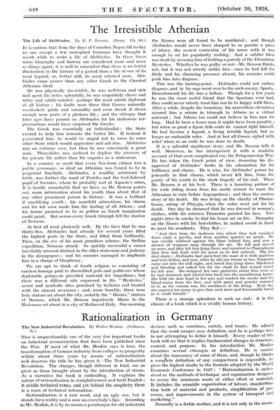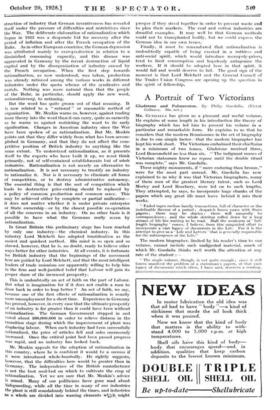Rationalization in Germany
The New Industrial Revolution. By Walter :Makin. (Gollancz. 9s.) Tuts is unquestionably one of the very few important books on industrial reconstruction that have been published since the War. If most of what Mr. Meakin says is true, the transformation of German industry from collapse to prosperity within about three years by means of rationalization well deserves the title he has given it—The New Industrial Revolution. The changes, though different in kind, are as great as those brought about by the introduction of steam. As a narrative the book is enthralling. It explains the nature of rationalization in straightforward and lucid English ; it avoids technical terms, and yet behind the simplicity there
is a mass of technical information.
Rationalization is a new word, and an ugly_ ore, but it stands for a reality and is now on everybody's lips. According to Mr. Meakin, it is by no means a pseudonym for old industrial
devices such as combines, cartels, and trusts. He admits that the word escapes easy definition, and he is. perhaps Wise in not attempting to define it himself. Every reader of this book will see that it implies fundamental changes in structure, control, and purpose. In his introduction Mr. Meakin examines several attempts at definition. He is caustic about the inaccuracy of some of them, and, though he thinks a complete definition of any compactness is impossible, he gives the highest marks to the formula adopted by the World Economic Conference in 1927 :- " Rationalization is under- stood as the methods of technique and organization designed to secure the minimum waste of either effort or material. It includes the scientific organization of labour, standardiza- tion both of material and producti, simplification of pre- cesses, and improvementS in the system of transport and marketing:' Necessity is a fertile mother, and it lanot only in the recon- struction of industry that German inventiveness has revealed itself under the pressure of difficulties and restrictions since the War. The deliberate elaboration of rationalization which began in 1925 was a desperate bid for recovery after the period of inflation and after the French occupation of the Ruhr. As in other European countries, the German depression was attributed mainly to over-production in relation to a diminished consuming capacity, and this disease was aggravated in Germany by the recent destruction of liquid capital and by the disorganization of industry caused by the French occupation. When the first step towards rationalization, as now understood, was taken, production was already rationed among the various works in different industries under the quota scheme of the syndicates and cartels. Nothing was more natural than that the people of the Ruhr, in particular, should apply the new word, rationalisierung, to rationing.
But the word has quite grown out of that meaning. It is now related to a " rational " or reasonable method of organization. Mr. Meakin warns us, however, against reading more theory into the word than it can carry, quite as earnestly as he warns us against restricting the word to its early signification. Changes in American industry since the War have been spoken of as rationalization. But Mr. Meakin points out that they differ widely from what has been accom- plished in Germany, and that they do not affect the com- petitive position of British industry to anything like the same extent. To understand rationalization, as it presents itself to the experts who have built it up, we must think primarily, not of self-contained establishments but of whole industries. Rationalization is not merely an alternative to nationalization. It is not necessary to trustify an industry to rationalize it. Nor is it necessary to eliminate all forms of competition, or to destroy administrative autonomy. The essential thing is that the sort of competition which leads to destructive price-cutting should be replaced by a policy of common production and common sense. This may be achieved either by complete or partial unification— it does not matter whether it is under private enterprise or State ownership—or by the closest possible co-operation of all the concerns in an industry. On no other basis is it possible to have what the Germans really mean by rationalization.
In Great Britain this preliminary stage has been reached by only one industry—the chemical industry. In this industry Lord Melchett has adopted trustification as the easiest and quickest method. His mind is so open and so shrewd, however, that he is, no doubt, ready to believe other ways better for other industries. At all events, it is fortunate for British industry that the beginnings of .the movement here are guided by Lord Melchett; and that the most intelligent leaders of trade unionism are apparently willing to help him in the firm and well-justified belief that Labour will gain its proper share of the increased prosperity.
This is undoubtedly an act of faith on the part of Labour. But what is imagination for if it does not enable a man to draw back in order to leap better ? An act of faith, we say, because one of the first effects of rationalization is usually more unemployment for a short time. Experience in Germany has proved, however, in every case that the ultimate prosperity of an industry is far greater than it could have been without rationalization. The German Government stepped in and voted about £60,000,000 in order to relieve distress in the transition stage during which the improvement of plant was displacing labour. When each industry had been successfully rationalized, the price of articles fell and sales enormously increased. Once the critical point had been passed progress was rapid, and no industry has looked back.
Mr. Meakin appeals for the adoption of rationalization in this country, where he is confident it would be a success if it were introduced whole-heartedly. He rightly suggests, however, that the difficulties here would be greater than in Germany. The independence of the British manufacturer is not the best seed-bed on which to cultivate the crop of rationalization. Yet we are sure that. Mr. Meakin's advice 19 sound. Many of our politicians have gone mad about Safeguarding, while all the time in many of our industries the plant is still scandalously behind the times, and industries as a whole are divided into warring elements w) ;4:-..h might
prosper if they stood together in order to prevent waste and to plan their markets. The coal and cotton industries are dreadful examples. It may well be that German methods could not be transplanted bodily, but we could express the German idea in our own terms.
Finally, it must be remembered that rationalization is undoubtedly capable of being exerted in a ruthless and anti-social spirit, which would introduce monopoly-prices, tend to limit consumption and • hopelessly antagonize the workers. If it should be adopted here in that spirit, it would fail and would deserve to fail. The good sign of the moment is that Lord Melchett and the General Council of the Trades Union Congress are opening up the question in the spirit of fellowship.































































 Previous page
Previous page